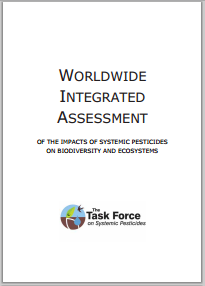The Worldwide Integrated Assessment of the Impact of Systemic Pesticides on Biodiversity and Ecosystems (WIA) has made a synthesis of 1,121 published peer-reviewed studies spanning the last five years, including industry-sponsored ones. It is the single most comprehensive study of neonics ever undertaken, is peer reviewed, and published as open access so that the findings and the source material can be thoroughly examined by others.
Some aspects of this analysis have been broadly acknowledged before (e.g. risks to honeybees), but some have not (e.g. risks to birds, earthworms, other pollinators and aquatic invertebrates).
Individual studies have focussed on impacts on particular organisms, habitats or locations (e.g. bees in France, waterways in the Netherlands, birds in the US) and relatively few have specifically focused on biodiversity and ecosystem impacts, so this analysis moves our understanding forward in a much more holistic and extensive way.
Where the available data enables this, the analysis extends consideration of the risks beyond individual species and groups, to whole communities and ecosystem processes.
29 authors representing many disciplines synthesized the scientific knowledge of the impacts (real and potential) of these systemic pesticides. The Worldwide Integrated Assessment has been published as a special issue of the Springer journal Environmental Science and Pollution Research in January 2015 consisting of eight papers:
- Editorial
- Trends, uses, mode of action and metabolites
- Environmental fate and exposure
- Impacts on invertebrates
- Impacts on vertebrates
- Risks of large-scale use of systemic insecticides to ecosystem functioning and services
- Alternatives to neonicotinoid insecticides for pest control: case studies in agriculture and forestry
- Conclusions
The WIA is also available as a single report containing all 8 scientific papers.


